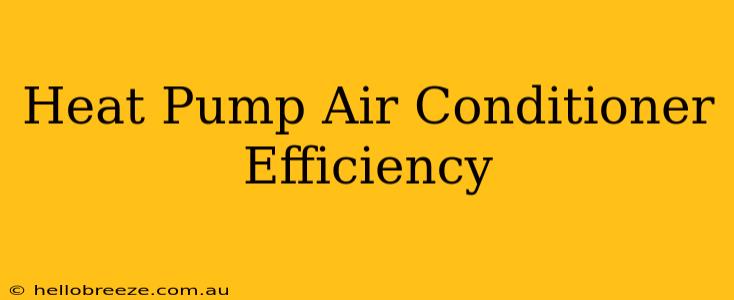Are you considering a heat pump air conditioner for your home? With rising energy costs, understanding heat pump air conditioner efficiency is crucial for making an informed decision. This comprehensive guide will explore the factors influencing efficiency, help you decipher the ratings, and ultimately guide you towards choosing the best system for your needs and budget.
Understanding Heat Pump Efficiency Ratings
Heat pumps excel in both heating and cooling, offering significant energy savings compared to traditional systems. However, not all heat pumps are created equal. Several ratings help determine their efficiency:
SEER (Seasonal Energy Efficiency Ratio):
This rating measures the cooling efficiency of your heat pump over an entire cooling season. A higher SEER rating indicates greater efficiency – meaning lower energy bills. The minimum SEER rating required in many areas is 14, but higher SEER ratings (16, 18, or even higher) translate to even greater savings in the long run.
HSPF (Heating Seasonal Performance Factor):
This metric measures the heating efficiency of your heat pump over a heating season. Similar to SEER, a higher HSPF signifies better efficiency and lower heating costs. Look for higher HSPF ratings for optimal performance in colder climates.
Understanding the Numbers:
A SEER rating of 16 means the heat pump produces 16 units of cooling for every unit of energy it consumes. Similarly, an HSPF rating of 9 means the heat pump generates 9 units of heating for every unit of energy consumed. The higher these numbers, the more efficient your heat pump will be.
Factors Affecting Heat Pump Efficiency
Several factors influence the efficiency of your heat pump air conditioner:
Climate:
Heat pumps operate most efficiently in moderate climates. In extremely hot or cold conditions, their performance might decrease, requiring supplemental heating or cooling.
Proper Installation:
Improper installation can significantly impact efficiency. Ensure a qualified HVAC technician installs your heat pump to optimize its performance. A poorly installed system will not reach its rated efficiency.
Regular Maintenance:
Regular maintenance, including filter changes and annual inspections, is critical for maintaining optimal efficiency and extending the lifespan of your heat pump. Neglecting maintenance can lead to decreased efficiency and costly repairs.
Home Insulation:
A well-insulated home minimizes heat loss in winter and heat gain in summer, allowing your heat pump to work more efficiently. Improving your home's insulation can significantly enhance the effectiveness of your heat pump.
Size and Type of Heat Pump:
Selecting the right size heat pump for your home is crucial. An oversized unit cycles on and off frequently, reducing efficiency, while an undersized unit struggles to meet your heating and cooling demands. Consider different heat pump types like ductless mini-splits, which can be more efficient in certain situations.
Choosing the Right Heat Pump for You
When selecting a heat pump, consider the following:
- Your climate: Consider the temperature extremes in your area.
- Your home's size and insulation: This will determine the appropriate capacity of the heat pump.
- Your budget: Higher SEER and HSPF ratings generally come with a higher upfront cost, but they pay off in long-term energy savings.
- Professional consultation: Consult with a qualified HVAC professional to assess your needs and recommend the best heat pump for your home.
By understanding heat pump air conditioner efficiency and the factors that influence it, you can make an informed decision that maximizes your comfort and minimizes your energy expenses. Remember that investing in an efficient heat pump is a worthwhile investment in long-term savings and environmental responsibility.

